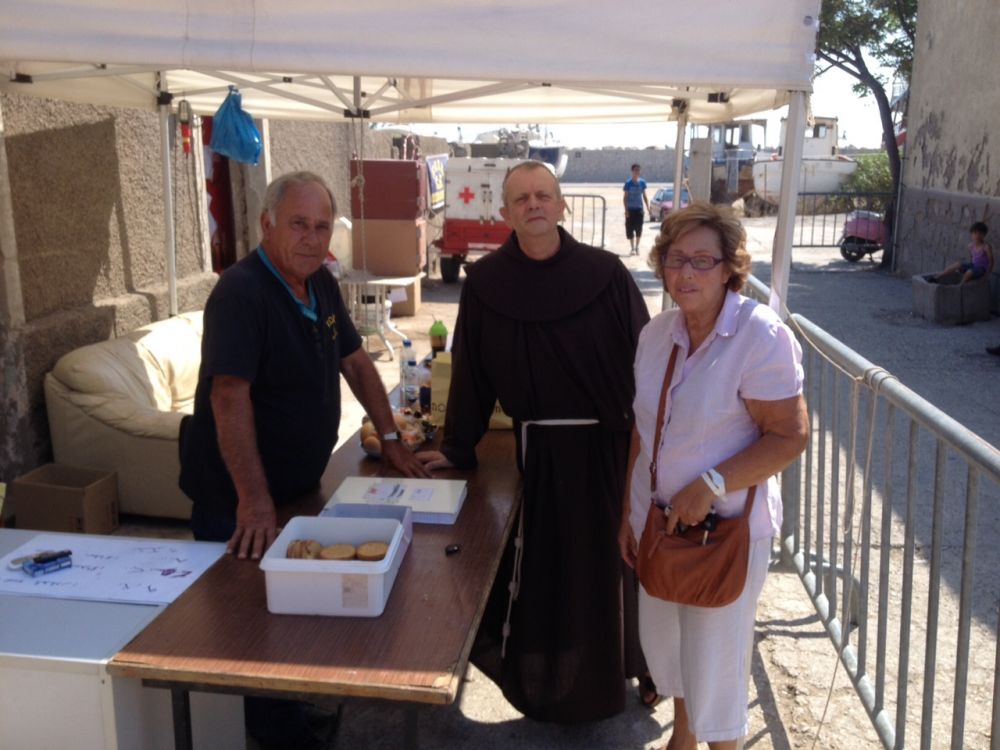
Refugee Crisis in Greece: Fr. Luke Gregory on what is happening in Rhodes and Kos
The General Chapter of the Custody of the Holy Land, which brings together around 150 friars from every province, has just come to a close. Among the friars was Fr. Luke Gregory, who in a recent interview tells about the refugee crisis which has hit Rhodes, the Greek island where he has served as parish priest for twelve years. Moreover, during the Chapter, Fr. Gregory was named Discretorium Representative for the Holy Land in the English language, so he will be joining the Custody in deliberating many decisive questions about the Custody’s future.
Fr. Luke, could you give us an update on the refugee crisis in Greece?
A law came into effect this past March (in concordance with the United Nations) by which all refugees should turn towards Turkey. Because of this law, right now no refugee may exit Greece and enter the other European countries. We know that the refugees are sent to Athens from Rhodes and Kos after a certain period of time. What we don’t know is what happens to them there, after they have been identified and received their documents. I speak of Rhodes and Kos specifically because the Franciscans are present in both, but the situation is the same in every other island. Right now, the main centers of rescue are Leros and Karpathos. When the coast guard succeeds in rescuing a migrant sea vessel, the vessel would be escorted towards these tow islands. But many still arrive to Rhodes and Kos, because they move at night in order to elude the radar. Several succeed in escaping out of Greece, at which point they move around without documents. It is not only the refugees who suffer, but also the Greeks now are beginning to feel the pinch. Tourism has gone down 40% and those who live from it during the peak months of touristic activity in the summer, are no more able to afford groceries in the winter.
Under what condition are the refugees when they arrive? How should we respond to this situation?
When I can, as often as I can, I go out to find them: they are in need of everything. We bring them all the primary necessities, as well as chocolates for the kids, and we spend some time with them. Few of the migrants know any language other than Arabic; the kids do not even know where they are; they think they are in France or Italy. We do what we can to respond to this emergency. For example, in the monastery we used to grow flowers, but now we use that space to grow vegetables. It’s a necessity. Our parishioners are also helping quite a lot: Every Tuesday, along with the novena and the vigil of Saint Anthony, people bring bread and leave it at the altar, in honor of the saint. On top of this, we bring the refugees other, non-perishable products: oil, rice, tuna. With this we prepare a few packets for the families of three or four people. We do a lot, but the need is great and the refugees are not receiving enough help.
What can we do to help?
The Association pro Terra Sancta has already done a lot, but I repeat: the need is great. We need funds to buy goods of all kinds, at least to provide first aid. I’ll tell you a story which explains the situation pretty well. There are many other refugee centers currently open, but Kos remains a center that takes in about 800 refugees. The center is administered by the UNHCR, I know the manager. Last month, they had run out of food and were waiting for supplies. The head of UNHCR mentioned this to me one evening at dinner, and I remembered that we had stocks of dates, biscuits and water in the parish. I keep this food in the crypt of the church of Kos, which I had built some time ago to celebrate Masses for the dead, which we now use as a storehouse. So I went into the storehouse and set up a table. It was Ramadan and therefore we prepared a veritable Iftar feast with those few dates, biscuits and water. The dates are perfect from a nutritional point of view, but for dinner they are not much. The refugees, however, were delighted. They kept thanking me. “It is like manna from heaven!” they said. That’s an example of how great the need is. But it doesn’t take much to help.